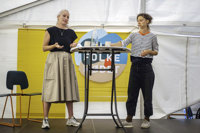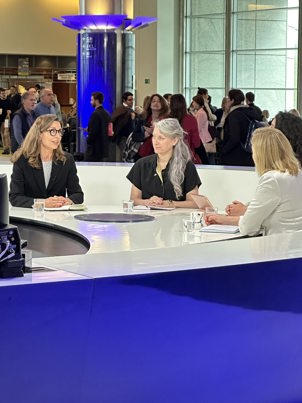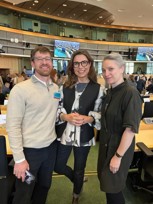
Introduction
Project Period: September 2022 – August 2023.
Project Status: Completed Pool: TRACE Pool 1
Lead: The Royal Danish Academy
This 10-month project has as its baseline a review of textile assessment schemes- and certifications, that helps form an understanding of the data gaps and lacking methodologies for assessing the actual environmental impact of textiles.
The rich and diverse knowledge pool of the project partners have, given their respective expertise within their fields, established a difficult but very reflected dialogue about the kinds of political instruments that could promote circularity and new economic models, whilst at the same time stay within planetary boundaries and address the climate crisis.

Aim and Scope
The EU textiles strategy of 30th of March 2022 is set to be implemented within a 5-year period. In the strategy, it is the ambition to build a sector before 2030 wherein ‘Consumers benefit longer from high quality affordable textiles’ (European Commission 2022). It is particularly these elements of the EU strategy that this project has been investigating, with a particular focus on locating barriers and incentives for furthering CE in the textiles sector. In particular, the project has been exploring assessment methods- and criteria for the environmental impact in the beginning of the lifecycle of plant-based textile fibers, and how these affects longevity-related properties in the use phase.
The project has had its main focus on textiles. However, as approximately 60-70% of textiles today are made of synthetic fibers, mainly the fossil-based material of polyester, the project is appropriately placed in the commons track. Furthermore, there is lots to learn between plastics and textiles when it comes to policy making and regulative incentives for promoting a more circular economy. This way, it has been an ambition of the project to harvest on the synergy effects of the TRACE partnership.

Partners involved
The project is embedded in the ‘Commons’ track and has been conducted in the period of September 2022 – August 2023. The Royal Danish Academy was lead and only knowledge partner. The project partners cover a broad base of stakeholders engaged with both material streams. From environmental initiatives and NGOs such as CONCITO, The Danish Consumer Council and the Danish Society for Nature Conservation; from public stakeholders operating in the circular waste sector such as Amager Ressource Center, The Technical and Environmental Development of Copenhagen Municipality, and Circular Denmark; industry represented by Salling Group; and the circular consultancies Målbar and Revaluate. Specially invited guests from Danish Fashion & Textiles, Danish Chamber of Commerce, and The European Environment Agency have furthermore contributed to the 2 larger project workshops held in Spring of 2023.
Unmet needs
‘Regulation and Promotion of CE’ builds on a pilot project conducted January-December 2021 in which the leading 7 sustainability consultancies for the Danish textiles sector were interviewed, locating an urgent need for a more solid baseline supporting their advice. The state of affairs is that assessment criteria for validating what longer-lasting, high-quality textiles are, are currently flawed and lacking of data. Thus, the project elucidates discrepancies between assessment criteria within agriculture and textiles, as well as it highlights lacking data on the use phase of textiles and connects this with a thorough analysis of existing certification schemes applied to textiles today. This brings forward the following insights:
- how textiles are poorly assessed today
- how assessments are being understood and practiced within industry
- what this means for the quality and longevity of textiles
- What this means for CE policy making and regulative incentives going forward

Project activities
The foundation of the project is literature reviews of assessment criteria for textiles, with plant-based textiles as example case. Based on this, the project has been hosting a series of 3 partner workshops with the aim of growing shared recommendations of policy and regulation that can support CE for textiles going forward. Project employees has conducted two travels; to OsloMet/SIFO in Norway to visit leading scholars on the use phase of textiles; and to the European Parliament in Bruxelles to observe the voting of the EU Textile Strategy amendments and interview leading stakeholders, politicians and NGOs involved in the implementation process of the strategy.
Project deliveries
The project has contributed to a more profound understanding of what type of data and assessment parameters are needed to validate what longer lasting, high-quality textiles are. It is an urgent matter since the EU Textiles Strategy has this as the very foundation for its 16 various elements and its ambition of ending the era of fast fashion.
All partners have contributed to a shared document with recommendations for future regulation policy making for a more circular texile sector in Denmark. The document will be central in political negotiations of a textile sector focus towards circular transition, as it has been passed over to the Alliance against Waste of Garments* https://taenk.dk/det-kaemper-vi-for/sammen-mod-toejspild
You can read more about the project in this scientific paper* published at the PLATE conference in Helsinki in May 2023 (pp. 965-971) https://aaltodoc.aalto.fi/bitstream/handle/123456789/122687/isbn9789526413679.pdf?sequence=1&isAllowed=y
Project insights were also being presented in this podcast by the EEP Group in the European Parliament*https://www.eppgroup.eu/newsroom/podcasts/eu-textile-strategy-a-path-to-sustainability as well as on the Klimafolkemøde in collaboration with Circular Denmark
https://cirkulaer.dk/nyheder/find-os-paa-klimafolkemoedet-til-debatter-om-cirkulaer-oekonomi
Even if the project has ended, the insights will be integrated in the TRACE partnership as the PI Else Skjold is also responsible workstream leader of textiles.
Project Leader

Else Skjold
Mail: eskj@kglakademi.dk
Other Common Projects




